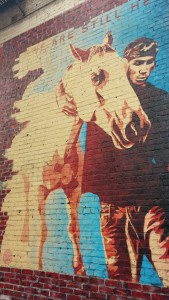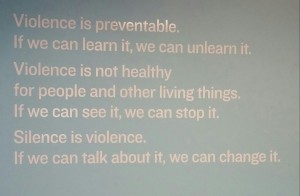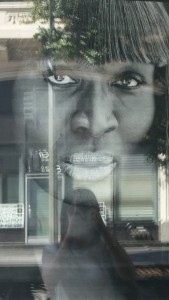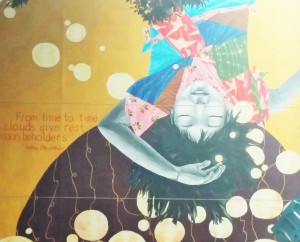Having presented my experiences in LA to the MIIS community in conjunction with the group that went to the Philippine island of Mindanao, I was struck by how similar and yet how different our experiences were.
On one hand, they had a multi-cultural experience where they were exposed to new gestures, a different language, different food and a completely different environment. I, on the other hand was in what I consider my native state, speaking uniquely English with other native English speakers. People didn’t seem odd to me, I blended in to my surroundings and I felt at home, like it could have been a town that I could have lived in. So the cultural experience wasn’t so pronounced for me as it was for the group that left the country. But that’s not what is odd.
What is odd is that the way I digested knowledge, the way that i interpreted my surroundings was through the lens of a native. I felt that i understood the historical, spatial and economic realities of LA and i took my lens for granted. Seeing LA, for the first time, but somehow, not. Being in skid row for the first time but the fact that i could place the policies and the history that created skid row, made it seem familiar, almost something that was obvious. I found myself reinforcing the historical and political narrative that I have cultivated instead of trying to create a new one.
So the group that went to Mindanao, did not have that lens of the “obvious”. They were perhaps able to be less judgmental because they were there, in actuality and mentally, for the first time.
I cannot write to the experiences of others, but i can recount my own. I feel that there was something yet still lost in the experience of LA, something intangible that i can’t quite get at. I was blocked in my understanding by my preconceptions, by in fact, the over information that i have about Los Angeles. How do we tear down that wall of knowledge that blocks us from having “new eyes” to see with “new ears” to hear with and a new sense of discovery. How do we eliminate the curse of knowledge in order to have a learning experience like you would have leaving the country?
Working in graduate school, it seems like there is a never ending competition to know everything, to be more informed, to do more and more research. In the classroom setting this is useful. Once in the field, the “real world” this seems to almost hinder people. In LA we hear “just shut up and listen” because people weren’t able to have a voice to express themselves because all the “educated” people ( I use the quotation marks sarcastically, school diplomas don’t seem to make people smarter) had researched the problems of others, they had the economic model on a piece of paper. Poor people are reduced to numbers and statistics, and their voices are lost because people, like me, already “know” what’s happening.
My lesson in this is to listen. to have the humility to not “know the answer”. To break the paradigm of proving how smart i am by speaking for others. Intelligence lies in humility and knowing when you don’t know something. And being able to ask and listen to others.
 e tide that pulls us unconsciously in one direction or another? How do we become the best versions of ourselves?
e tide that pulls us unconsciously in one direction or another? How do we become the best versions of ourselves?
 ected crowded food desert that houses bad schools and out of touch teachers.
ected crowded food desert that houses bad schools and out of touch teachers. esn’t provide the outcomes that represent the people that it serves. To begin the healing, we need to reform the system. Not only the criminal justice system. The school system that has chronically failed our students of color. The development systems that displace people and perpetrate poverty, the legal systems, the political systems. We are reaching a “tipping point” is something that many people have said to us. The old status quo doesn’t serve the interests of the people, it doesn’t create the outcomes that we want, and it no longer has the legitimacy it needs to continue to operate.
esn’t provide the outcomes that represent the people that it serves. To begin the healing, we need to reform the system. Not only the criminal justice system. The school system that has chronically failed our students of color. The development systems that displace people and perpetrate poverty, the legal systems, the political systems. We are reaching a “tipping point” is something that many people have said to us. The old status quo doesn’t serve the interests of the people, it doesn’t create the outcomes that we want, and it no longer has the legitimacy it needs to continue to operate. s and outreach there.
s and outreach there.

